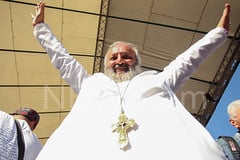
For much of Europe and the Middle East, the Syrian refugee crisis has become a human tragedy. Syrian children sell chewing gum on the streets of Mosul and collect food on farms in Lebanon, said Michael Rubin, a research fellow at the American Enterprise Institute, in an article in the National Interest.
Jordanian TV covers the plight of refugee girls who once dreamed of becoming doctors or lawyers but were taken as second wives to escape refugee camps. The Syrians board wobbly boats and rafts in a desperate attempt to reach Europe. Some succeed, but not many, the author added.
According to the author, Turkey is home to the largest number of Syrian refugees, and the country has devoted significant resources to their health and well-being. However, where others see tragedy, Turkish President Recep Tayyip Erdogan sees opportunities. Not only has he weaponized the threat of refugee dumps on European shores to blackmail Europe into big diplomatic concessions, but he has also used predominantly Sunni refugees to wage a demographic war against Turkish minorities, whose identity Erdogan seeks to erode.
According to Turkish parliamentarians and provincial officials, Erdogan's top authorities are offering Syrian Sunni Arabs the opportunity to both escape refugee camps and obtain the privileges of Turkish citizenship. In both cases, Erdogan's goals are simple: use Sunni Islamists to dilute minorities, or tip the scales in closed areas in favor of his own party.
In the Kurdish-dominated areas of Syria, Erdogan used the same strategy. He justified Turkey's military incursions as actions to combat terrorism, and more recently, with the rhetoric of creating a refuge or buffer zone for the repatriation of Syrian refugees. Although, in reality, his policy was to ethnically cleanse the regions in order to drive out Kurds, Christians, and Yezidis and replace them with Sunni Arab Islamist communities. And it was precisely the fact that diplomacy turned a blind eye to this that activated Erdogan's strategy.
Perhaps it was this success that inspired Erdogan and his ally, Azerbaijani President Ilham Aliyev, to repeat the same strategy in Nagorno-Karabakh, the researcher adds.
Turkey facilitated the delivery of more than 7,700 Syrian Islamists to Azerbaijan in the months before the outbreak of hostilities in Karabakh, according to documents seized during the recent Armenian-Azerbaijani war, as well as interrogations of prisoners of war. Several journalists from Azerbaijan have confirmed the presence of Syrian mercenaries.
For all of Aliyev's rhetoric about Karabakh as the heart of Azerbaijan, few Azerbaijanis want to live there: Azerbaijan is an oil-rich country, and most jobs and infrastructure are located around Baku, 250 miles away. In Karabakh, those returning from the front suggest that Syrian mercenaries are simultaneously sending their family members to Azerbaijan and then seeking to settle in the southern regions of Karabakh, which have now returned to Azerbaijan, the author adds.
According to the author, while Erdogan and Aliyev may celebrate the liberation of the region from Christians, replacing them with mercenaries will be a time bomb for the South Caucasus. They will not only create tensions within the Shiite majority in Azerbaijan but if they try to unite with jihadists in the North Caucasus, they can destabilize the region and provoke wider Russian intervention in the region.
According to Rubin, Turkey planned the time of the war perfectly. Erdogan understood that Washington was distracted by both the upcoming elections and the coronavirus crisis. The co-chairs of the Minsk Group France, Russia, and the United States should demand that Azerbaijan detain all mercenaries. Syrian mercenaries who participated in the war in Nagorno-Karabakh must be detained. Inaction would not only add fuel to the flames of regional instability but would also guarantee further religious violence and demographic games, as Erdogan and now Aliyev concludes that they can literally escape punishment for murder.






















